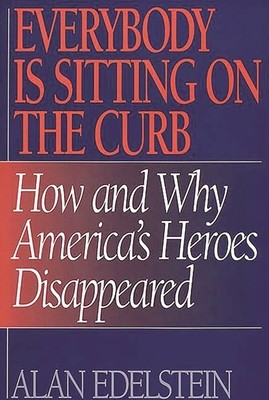
- We will send in 10–14 business days.
- Author: Alan Edelstein
- Publisher: Praeger
- ISBN-10: 0275953645
- ISBN-13: 9780275953645
- Format: 16.6 x 24.4 x 2.5 cm, kieti viršeliai
- Language: English
- SAVE -10% with code: EXTRA
Reviews
Description
The traditional American hero has disappeared and is unlikely to return. Dr. Edelstein explains in fascinating detail how and why that disappearance occurred and the consequences for the nation. Using a sociological approach, he examines the changes that have taken place within American society since World War II to bring about the demise of heroes.
The United States has run out of heroes. Hero refers to a national hero, a Universal American around whom we all would rally if called. The hero is the man--rarely the woman--who inspires children and adults, and reflects the finest qualities of the American people. He is recognized as an inspiration, seen as someone engendering our best qualities. It is not that the hero represents most if not all Americans; it is that most if not all Americans are happy to have him as their representative. This is the man, the role, gone from our lives, permanently.
Edelstein gives a vivid description of heroes of America's past, and offers an explanation of the national appeal of such men as Billy the Kid, Babe Ruth, Franklin Delano Roosevelt, Martin Luther King, Jr. He describes how many of the fields from which Americans once drew their heroes have disappeared, and how the structures of other fields that were once sources of heroes have been altered, thereby obstructing the creation of new heroes. Not that heroism is dead. To the contrary, many Americans are often found performing heroic acts: police officers and fire fighters, federal agents and everyday people are regularly commended for committing acts above and beyond the call of duty. But these heroic actions are usually noted only on a local level. To be an American hero is to be a national hero. This is accomplished by an act of an individual that demands and receives national attention. But that doesn't seem to happen anymore. It is difficult to recall the last ticker-tape parade for an individual American hero. Parades now celebrate groups: freed hostages, winning sports teams, returning service personnel. The book concludes with a discussion on the ramifications of the disappearance of the American hero.
EXTRA 10 % discount with code: EXTRA
The promotion ends in 22d.23:16:46
The discount code is valid when purchasing from 10 €. Discounts do not stack.
- Author: Alan Edelstein
- Publisher: Praeger
- ISBN-10: 0275953645
- ISBN-13: 9780275953645
- Format: 16.6 x 24.4 x 2.5 cm, kieti viršeliai
- Language: English English
The traditional American hero has disappeared and is unlikely to return. Dr. Edelstein explains in fascinating detail how and why that disappearance occurred and the consequences for the nation. Using a sociological approach, he examines the changes that have taken place within American society since World War II to bring about the demise of heroes.
The United States has run out of heroes. Hero refers to a national hero, a Universal American around whom we all would rally if called. The hero is the man--rarely the woman--who inspires children and adults, and reflects the finest qualities of the American people. He is recognized as an inspiration, seen as someone engendering our best qualities. It is not that the hero represents most if not all Americans; it is that most if not all Americans are happy to have him as their representative. This is the man, the role, gone from our lives, permanently.
Edelstein gives a vivid description of heroes of America's past, and offers an explanation of the national appeal of such men as Billy the Kid, Babe Ruth, Franklin Delano Roosevelt, Martin Luther King, Jr. He describes how many of the fields from which Americans once drew their heroes have disappeared, and how the structures of other fields that were once sources of heroes have been altered, thereby obstructing the creation of new heroes. Not that heroism is dead. To the contrary, many Americans are often found performing heroic acts: police officers and fire fighters, federal agents and everyday people are regularly commended for committing acts above and beyond the call of duty. But these heroic actions are usually noted only on a local level. To be an American hero is to be a national hero. This is accomplished by an act of an individual that demands and receives national attention. But that doesn't seem to happen anymore. It is difficult to recall the last ticker-tape parade for an individual American hero. Parades now celebrate groups: freed hostages, winning sports teams, returning service personnel. The book concludes with a discussion on the ramifications of the disappearance of the American hero.


Reviews